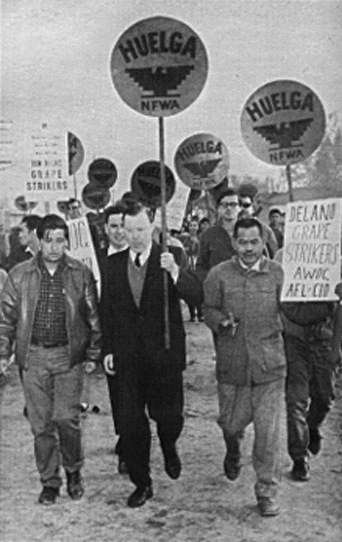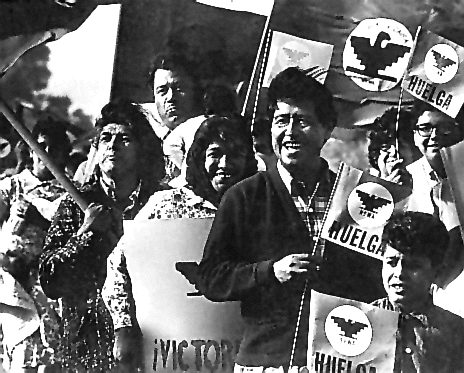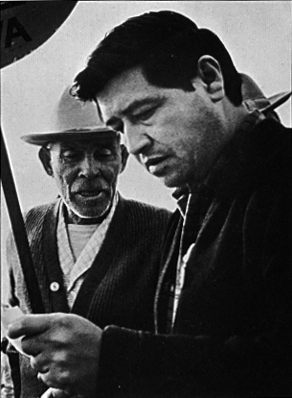
Cesar E. Chavez
BIOGRAPHY

During the 1880’s Cesario Chavez, Cesar Chavez’s grandfather, also know as Papa Chayo, escaped the slavery that was taking place in the Hacienda del Carmen in Chihuahua, Mexico. Once Cesario was settle in Arizona, he send forhis wife and kinds to have a better life in the Americans. Latter on, Cesario became the owner of a huge adobe farmhouse, and the owner of a well productive farm. The farm produced cotton, carrots, lettuce, and other food crops that fed not only the Chavez family, but other hungry families. All of Cesario’s children got marry and moved out of the house except for Librado, Cesar’s father, who stayed with his dad and new family to work the farm.
During the great depression, Papa Chayo passed away and Cesar Chavez family was left with unpaid property taxes, and other bills. The farm and all the properties were taken away from Librado because he was unable to come up with the money owned. Due to this situation the Chavez family had to move around to different places in search for jobs, and in order to survive in the difficult circumstances.
Like many other migrant families, the Chavez family had to relocate continuously enabling many kids to continue their education. Many of these children, like Cesar and his siblings had to drop out of high school or not even enroll because of financial problems. When Cesar graduated from the eight grade, he immediately join the hard labor fields in California, Nevada, and other places around this coasts to help support the family.
Working in a farm with all the other millions of farm workers Cesar Chavez experience exploitations from the growers to the workers. Seeing that, he tried to help the workers to obtain better benefits and to get the wages raised, but he was lacking the support of his fellow workers, therefore he was unable to take action. The workers did not support him because they were afraid of losing their jobs and because they did not trusted Chavez.
 Through
Cesar’s life, he became acquainted with discrimination. While he was in
school he was being discriminated, just like other Mexican descendents because
they spoke Spanish better than English. While working on the
fields, he was being put down by the owners when he complained about benefits
and pay wages. The owners laughed at him and threaten his life, just
because he was asking for his rights. One day Fred Ross, the founder of
the Community Service Organization wanted to talk to Chavez about joining his
organization. Chavez was afraid because all that white
people wanted was to humiliate Mexicans like his teachers, and the growers did.
Also becuase all they wanted was to know how his family eat tortilla with beans. Chavez thought
that was his family business and that he did not have to talk about his private
life with white people. Chavez wanted to show Fred Ross how they felt
when white individuals insult them and put them down, by
sending his friends to beat him up, buy after the long talk that he had
with Ross, Chavez realize that he was only trying to help his family and many
other migrant families. Ross main reason for asking Chavez to join his CSO organization
was to help the migrant workers understand their rights and to help them
register to vote. As they conversed more about the plan Cesar finally trusted.
He joined the organization and his first task was to organize the farm workers
to register to vote. He was with CSO for ten years and there,
with the help of Ross, he learned many tactics that will help a union survived.
Nonviolent tactics such as protest marches, strikes, and boycotts, that usually
were successful and helpful for the organization.
Through
Cesar’s life, he became acquainted with discrimination. While he was in
school he was being discriminated, just like other Mexican descendents because
they spoke Spanish better than English. While working on the
fields, he was being put down by the owners when he complained about benefits
and pay wages. The owners laughed at him and threaten his life, just
because he was asking for his rights. One day Fred Ross, the founder of
the Community Service Organization wanted to talk to Chavez about joining his
organization. Chavez was afraid because all that white
people wanted was to humiliate Mexicans like his teachers, and the growers did.
Also becuase all they wanted was to know how his family eat tortilla with beans. Chavez thought
that was his family business and that he did not have to talk about his private
life with white people. Chavez wanted to show Fred Ross how they felt
when white individuals insult them and put them down, by
sending his friends to beat him up, buy after the long talk that he had
with Ross, Chavez realize that he was only trying to help his family and many
other migrant families. Ross main reason for asking Chavez to join his CSO organization
was to help the migrant workers understand their rights and to help them
register to vote. As they conversed more about the plan Cesar finally trusted.
He joined the organization and his first task was to organize the farm workers
to register to vote. He was with CSO for ten years and there,
with the help of Ross, he learned many tactics that will help a union survived.
Nonviolent tactics such as protest marches, strikes, and boycotts, that usually
were successful and helpful for the organization.
During his full-time position with the CSO Chavez and the organization made better progress in letting the workers know their rights, and getting most of the workers register to vote. Chavez great courage and leadership helped the organization accomplish one of their most beautiful victories, which was organizing a march to complain about workers not getting jobs, but instead this workers were getting register cards and had to wait to be hired. During the march he made a speak, telling the workers not to ever register for jobs because they will never get one.

 Mexicans
had a very attraction for marches, it appear to them as if it was a pilgrimage,
and therefore with their heads high up every single worker was in, when asked to
join one. In many no-violent marchers Chavez faced various problems, like
when the cops come out saying that parades were not allow. Chavez eagerness to
help his people was immense that his reply to the cops was “You can not stop us” and “I don’t care if I have to go to
jail." Showing affection and loyalty to Chavez's courage the workers
responded to the cops that if Cesar was taken to jail, then they had to also
take them. Due to this
situation, the police had no other choice and decided to provide an escort.
Finally the thirteen-month fight to get jobs for the migrants workers was a
success. The CSO become a hiring hall were growers would come in and tell them
they needed worker, and workers making big lines in the street to become members
of the organization and apply for jobs within the CSO. Chavez was please
with his triumph that he wanted to go on strike and get some contracts, but the CSO did not approved
his request.
Mexicans
had a very attraction for marches, it appear to them as if it was a pilgrimage,
and therefore with their heads high up every single worker was in, when asked to
join one. In many no-violent marchers Chavez faced various problems, like
when the cops come out saying that parades were not allow. Chavez eagerness to
help his people was immense that his reply to the cops was “You can not stop us” and “I don’t care if I have to go to
jail." Showing affection and loyalty to Chavez's courage the workers
responded to the cops that if Cesar was taken to jail, then they had to also
take them. Due to this
situation, the police had no other choice and decided to provide an escort.
Finally the thirteen-month fight to get jobs for the migrants workers was a
success. The CSO become a hiring hall were growers would come in and tell them
they needed worker, and workers making big lines in the street to become members
of the organization and apply for jobs within the CSO. Chavez was please
with his triumph that he wanted to go on strike and get some contracts, but the CSO did not approved
his request.
Chavez had a great heart, and was constantly sacrificing what he had to help others. He wanted to start his own union to obtain better benefits for the migrants, but the organization got frightened after national headquarters received calls from labor threaten them. Because he was unable to go on strike and help his people "Hispanic" he quit the organization his only steady, and well paid job, and went in search for individuals to form his own union.
The National Farm Workers Association started in September 30, 1962 by Cesar Chavez right after he quit the CSO. Chavez new that in the past for more than 125 years the farm worker’s struggle to organize and go on strikes was always destroyed by the power that the growers had from the police, courts, state and federal laws. It was a history with records of defeats after defeats. Chavez wasn’t scared and decided to fight for his rights and many other individual rights.
Gradually Chavez union
got stronger with more members each time, ready to fight together for their
freedom and to prove that they were not alone or salves as growers and other
individuals had thought. Chavez started to go on strikes, like the rent,
and roses strikes but he only accomplished raising the wages, not contracts sing by the owners. In September 8, 1965
Chavez heard the Filipino’s went on a grape strike for higher wages, therefore
he had a conference with the union to discuss if they should go on strike or
wait. In September 16, 1965 the union decided to go and support the
Filipinos, joining the grape strike.

The battle of the grapes lasted five years. This years were years of fasting to garner support for non-violence in the organizing efforts of the union, worldwide grape boycotts, marches to the state Capital, and even sues that Chavez received from the growers were part of hard, but successful fight for better working benefits. In 1970, the growers finally singed the contract agreement with Chavez. The contract allowed farm workers to obtain better health benefits and payment.
Not only the grape, rent, or roses strikes were the accomplishments that Chavez achieve, but under his leadership he made many historic triumphs, with the help of the farm workers. The United Farm Workers as it change its name in 1973, was the first union to obtain a contract regulating safety and sanitary conditions in farm labor camps, the first and only performing pension plan for retired farm workers, the first union to restrict the usage of dangerous pesticides, and the first union in history to change the life of the migrant workers with the help of the hero, Cesar Estrada Chavez. By 1980’s, every family started to enjoyed the many benefits and higher payments of the contract signed.
Sources agree that Cesar Chavez sacrificed his family time, and stable job with a very good paycheck, to help his people, the Hispanic migrants. Because of this, and his courage to continue fighting for the migrant rights and freedom, today he “is best know for his efforts to gain better working conditions for the thousands of workers who labored on farms for low wages under severe conditions.”